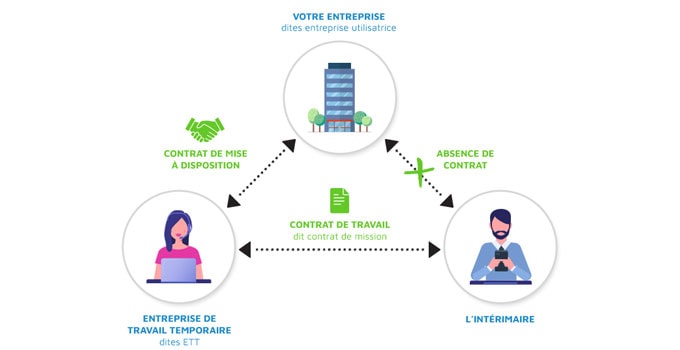Legal Framework and Issues
The temporary work, including the temporary employment sector in Morocco : legal framework and issues, is an alternative to fixed-term contracts (CDD) and indeterminate (CDI), allowing companies to meet specific needs of hand-dwork. Temporary employment undertakings (ETT) are particularly important in this context because they facilitate theaccess to a hand-dwork appropriate. It is governed by specific rules listed in the labour Code, in moroccan law (65-99), designed to support such flexibility, while protecting the rights of workers. This article discusses key aspects of the business of temporary work (ETT), including their definition, mission, legal framework, terms and conditions ofuse and limitations.

1. Definition of the temporary employment company
1. Temporary employment undertakings and their importance
to The business of temporary work (ETT) play a critical role in the labour market in Morocco. They offer flexible solutions to companies who have needs of labour oftemporary workers.
The temporary employment company (ETT) is an independent legal entity that puts workers temporarily at the disposal of the user companies. In contrast to a public administration, it operates under a private context and assumed responsibilities the major legal, including :
The temporary employment sector also provide a legal framework which governs relations between employers and workers. This helps to ensure that the fundamental rights while responding to the needs of the market.
The temporary employment sector in Morocco play a crucial role in theeconomy, by providing flexible solutions to the challenges of the labour ofpresent work.
- Affiliation, and returns to the NSSF (National Social Security Fund) (Section 503 of the labour Code).
- Compliance with the standards of hygiene and safety (Section 504 of the labour Code).
- Coverage of workers in terms of occupational accidents and occupational diseases (Section 504 of the labour Code).
2. Mission and role of the business of temporary work
The temporary employment sector are also involved in the training and development of workers, and enhances their employability in the market.
Article 477 of the labour Code defines the mission of the ETT, which is based on the intermediation in the area of employment. This mission includes :
Temporary employment undertakings (ETT) play a key role in establishing links between the workers and businesses who are in need ofa hand-d’œuvre adaptable.
- The relationship of supply and demand on the labour market.
- The provision of services related to the search for employment and professional integration.
- The recruitment of workers for the purpose of temporarily available to a user enterprise.
The enterprise defines the mission of workers in the framework of the temporary employment sector and supervises the execution, but the ETT remains the legal employer responsible for all legal aspects.
3. Legal framework of business for temporary work
The ETT is the main employer of temporary workers. As such, it :
- Recruiting the employees, and establish with them a temporary employment contract.
- Assumed the entire legal obligations related to the employment contract.
- Pays wages, and provides social statements.
The temporary employment contract must contain the elements required under sections 499, 501 and 502 of the Code of work, including the reason for the appeal, the duration of the mission, the professional qualification and terms of payment.
4. Terms of use by the user enterprise
Temporary employment undertakings must comply with the legislation in force to protect the rights of workers thatthey employ, providing a hand-dimplementation of fair and respectful of the standards.
The use of a temporary employment company is subject to strict rules to prevent the abuse and the casualisation of employment. Under article 496 of the labour Code, it is allowed in the following cases :
- Replacement of an employee who is absent (excluding the strike).
- Temporary increase of activity.
- Seasonal work.
- Jobs that require a CSD or a temporary job by nature.
5. Situations prohibited
Article 498 of the labour Code prohibits the use of temporary work in some cases, including :
Temporary employment undertakings should be aware of the challenges posed by the management ofa hand-dtemporary workers, in particular as regards compliance with social and legal norms.
- Redundancy : a company can’t hire a temporary worker to a position removed following a dismissal for a year.
- Replacement of an employee who was dismissed for economic reasons.
6. Relations between the ETT and the user enterprise
Section 499 of the Code of the work requires the conclusion of a contract for the provision, which must include :
In conclusion, the temporary employment sector is essential to meet the changing needs of the labour market, offering flexibility and diversity in the solutions ofemployment.
- The reason for the use of temporary work.
- The duration of the mission and the place of performance.
- The rate of the salary paid to a temporary worker.
The ETT and the operating company are bound by a separate agreement of the employment contract, guaranteeing the legal framework for temporary work.
7. Duration of the mission and renewal
The duration of the temporary assignment is strictly regulated by article 500 of the labour Code :
- Period equal to that of the absence of the employee being replaced.
- Three months, renewable once.
- Six-month non-renewable for some missions.
Conclusion
Temporary work in Morocco is a mechanism box that allows companies to address the needs of labour-work, while guaranteeing that workers of fundamental rights. However, its use is limited in order toprevent abuse and precarious jobs.
Thus, the temporary employment sector is a key element of the structure of theemployment in Morocco, providing a balance between the needs of companies and the rights of workers.



Comments are closed